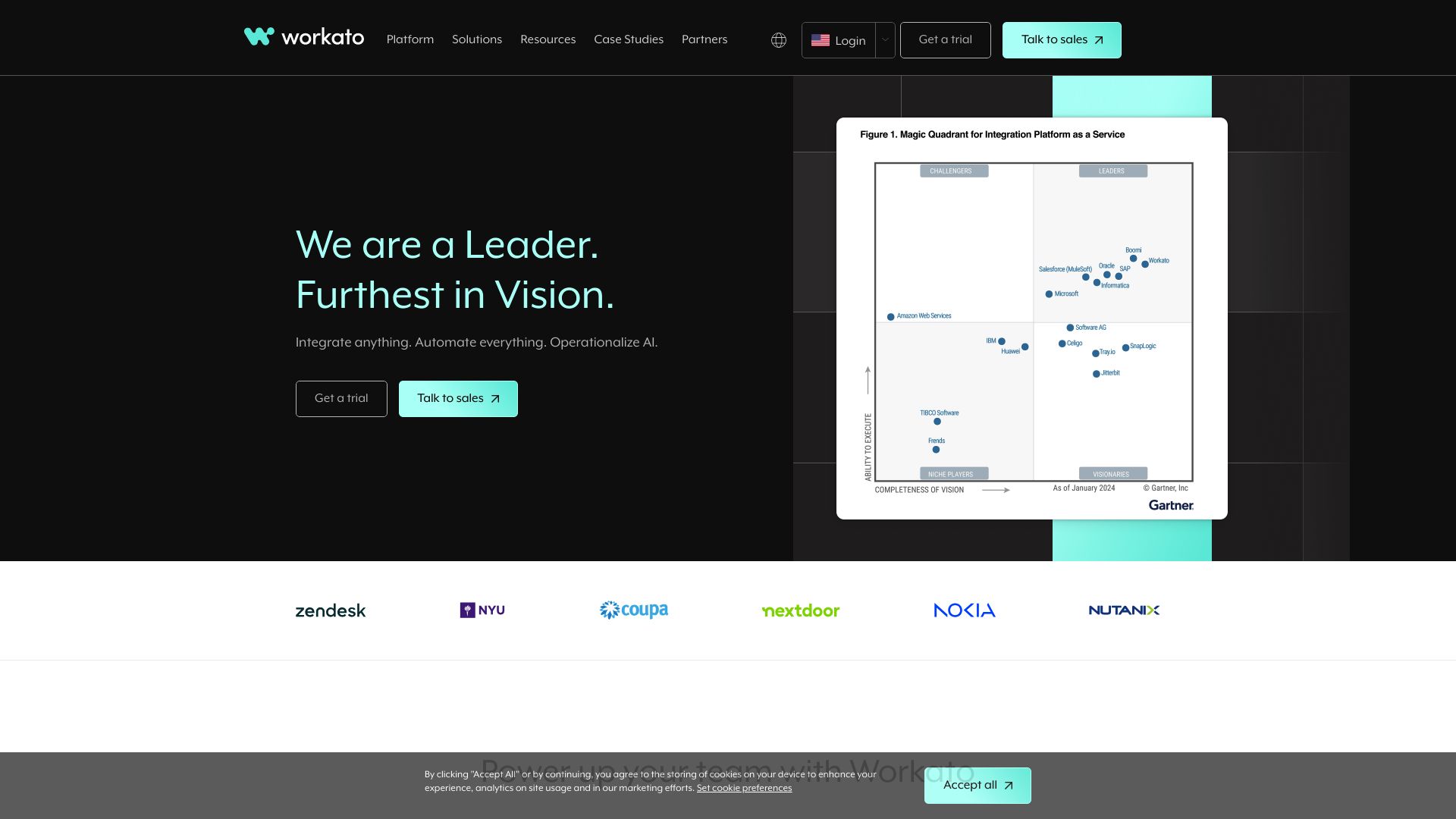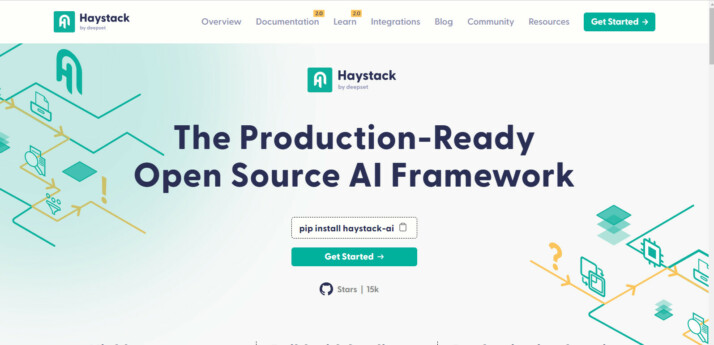Workato vs. Haystack: AI Automation Platforms Compared
Artificial intelligence revolutionizes business operations, sparking fierce competition among platforms vying to offer the most powerful and user-friendly solutions. This comparison delves into Workato vs. Haystack, and SmythOS, three leading contenders in the AI automation space. We’ll examine their unique approaches to workflow integration, development flexibility, and enterprise-grade features.
By exploring each platform’s strengths and limitations, this review equips decision-makers with crucial insights to select the ideal AI solution for their organization’s needs. Whether you’re a developer seeking robust customization options, a business leader focused on scalability and security, or a non-technical user looking for accessible AI tools, our analysis will guide you through the landscape of AI-powered automation and help you make an informed choice.
Workato Overview
Workato empowers businesses to automate complex workflows and integrate diverse applications without extensive coding. This enterprise-grade platform combines low-code accessibility with powerful AI capabilities, making it a versatile solution for organizations seeking to streamline operations and enhance productivity.


Workato’s AI integration, developed in partnership with OpenAI, enables users to incorporate advanced AI models into their workflows without compromising data security. The platform offers a range of AI-powered actions, including text analysis, categorization, email drafting, and translation. These capabilities allow businesses to automate complex tasks and make data-driven decisions more efficiently.
Workato’s AI integration … enables users to incorporate advanced AI models into their workflows without compromising data security.
The platform’s visual interface and pre-built connectors simplify the creation of sophisticated automations. Users can leverage over 1,500 app connectors and community-shared recipes to quickly build and customize integrations. This approach significantly reduces the learning curve for new users while providing flexibility for more advanced implementations.
While Workato excels in many areas, it’s important to note some limitations. The platform’s AI capabilities are subject to rate limits, which may constrain usage for high-volume applications. Additionally, the lack of granular permission settings for AI features means all workspace collaborators have equal access, potentially raising security concerns for some organizations.
Workato’s enterprise focus ensures scalability, security, and governance features suitable for large organizations with complex automation needs. However, this enterprise-grade functionality comes at a cost that may be prohibitive for smaller businesses or those with limited budgets. Despite this, Workato’s comprehensive feature set and robust integration capabilities make it a compelling choice for organizations looking to drive digital transformation through intelligent automation.
Haystack Overview
Haystack transforms the landscape of AI-powered applications, offering developers a robust open-source framework for building production-ready solutions. This versatile platform excels in leveraging Large Language Models (LLMs), Transformer models, and vector search to tackle complex tasks such as retrieval-augmented generation, document search, and question answering.


Haystack transforms the landscape of AI-powered applications, offering developers a robust open-source framework for building production-ready solutions.
Developed by deepset GmbH, Haystack stands out for its modular architecture, allowing seamless integration of tools like Hugging Face Transformers, Elasticsearch, OpenSearch, and various AI models from providers such as OpenAI, Cohere, and Anthropic. This flexibility empowers developers to craft bespoke search experiences and conversational chatbots tailored to specific needs.
Haystack’s strength lies in its ability to simplify the development process while maintaining powerful capabilities. The platform supports the creation of customizable pipelines, enabling developers to chain together different components for sophisticated AI functionality. This approach democratizes access to advanced NLP techniques, making it possible for teams with varying levels of expertise to build and deploy AI-driven applications efficiently.
Haystack’s strength lies in its ability to simplify the development process while maintaining powerful capabilities.
Haystack shines in its commitment to the open-source community, fostering innovation and collaboration. The platform’s extensive documentation and active community support provide developers with the resources needed to overcome challenges and push the boundaries of what’s possible with AI applications. However, users should be aware that leveraging Haystack’s full potential may require a solid understanding of NLP concepts and some programming experience.
While Haystack offers impressive capabilities, it’s important to note that it primarily focuses on providing a framework rather than a fully managed solution. This means that users are responsible for hosting, scaling, and maintaining their applications, which may require additional infrastructure and expertise. For organizations seeking a more hands-off approach, alternatives that offer managed services might be more suitable.
Feature Comparison
Workato and Haystack offer distinct approaches to AI-powered automation and development. Workato provides a comprehensive low-code/no-code platform for enterprise automation, while Haystack focuses on building AI-powered search and question answering applications.
Workato excels in workflow automation and integration, offering over 1,500 pre-built connectors and a visual interface for creating complex workflows. Its AI capabilities, developed with OpenAI, enable text analysis, categorization, and email drafting. However, Workato lacks granular AI feature permissions and imposes rate limits on AI actions.
Haystack, as an open-source framework, offers more flexibility for developers to build custom AI applications. It supports various AI models and integrates tools like Hugging Face Transformers and Elasticsearch. Haystack’s strength lies in its ability to handle tasks such as retrieval-augmented generation and document search. However, it requires more technical expertise to implement and maintain compared to Workato’s managed solution.
In terms of security, Workato provides multi-layer encryption and OAuth support, while Haystack’s open-source nature allows for customized security implementations. Workato offers more robust enterprise features like audit logs and IP control, which are essential for large-scale deployments. Haystack, being primarily a framework, leaves much of the security implementation to the developers.
For organizations seeking a balance between powerful AI capabilities and ease of use, SmythOS emerges as a compelling alternative. It combines the strengths of both platforms, offering a user-friendly interface like Workato with the flexibility and AI power similar to Haystack. SmythOS provides advanced features such as hosted agents, multi-agent collaboration, and a visual builder, making it accessible to users with varying technical backgrounds while still offering the depth needed for complex AI applications.
Feature Comparison Table
| Workato | Haystack | SmythOS | |
|---|---|---|---|
| CORE FEATURES | |||
| Visual Builder | ✅ | ❌ | ✅ |
| No-Code Options | ✅ | ❌ | ✅ |
| Autonomous Agents | ❌ | ✅ | ✅ |
| Multimodal | ❌ | ✅ | ✅ |
| Multi-Agent Collaboration | ❌ | ✅ | ✅ |
| Agent Work Scheduler | ✅ | ❌ | ✅ |
| SECURITY | |||
| Constrained Alignment | ❌ | ❌ | ✅ |
| IP Control | ✅ | ❌ | ✅ |
| COMPONENTS | |||
| Huggingface AIs | ❌ | ✅ | ✅ |
| Zapier APIs | ❌ | ❌ | ✅ |
| Data Lakes | ❌ | ❌ | ✅ |
| DEPLOYMENT OPTIONS (EMBODIMENTS) | |||
| Staging Domains | ✅ | ❌ | ✅ |
| Production Domains | ✅ | ❌ | ✅ |
| Deploy as Scheduled Agent | ✅ | ❌ | ✅ |
| DATA LAKE SUPPORT | |||
| Hosted Vector Database | ❌ | ✅ | ✅ |
| Sitemap Crawler | ❌ | ❌ | ✅ |
| YouTube Transcript Crawler | ❌ | ❌ | ✅ |
| URL Crawler | ❌ | ✅ | ✅ |
Best Alternative to Workato and Haystack
SmythOS stands out as a superior alternative to Workato and Haystack, offering a comprehensive platform for AI agent development and deployment. We combine the best of both worlds: the user-friendly interface of Workato and the powerful AI capabilities of Haystack, while addressing their limitations.
Our visual builder and no-code options make AI development accessible to users of all skill levels, surpassing Workato’s low-code approach and Haystack’s developer-centric framework. SmythOS empowers users to create sophisticated AI agents without extensive programming knowledge, significantly reducing development time and costs.
SmythOS empowers users to create sophisticated AI agents without extensive programming knowledge, significantly reducing development time and costs.
Unlike Workato’s limited AI actions and Haystack’s narrow focus on search and question answering, SmythOS offers a versatile platform for creating autonomous agents capable of handling a wide range of tasks. Our multi-agent collaboration feature enables complex problem-solving that neither Workato nor Haystack can match. This flexibility allows businesses to automate diverse processes and create AI solutions tailored to their specific needs.
SmythOS excels in integrations, offering support for various AI models, APIs, and data sources. While Workato provides numerous pre-built connectors, it lacks the AI model variety that SmythOS offers. Our platform integrates seamlessly with Hugging Face models, Zapier APIs, and data lakes, providing a rich ecosystem for AI development that surpasses both Workato and Haystack’s capabilities.
Security and scalability are paramount in SmythOS. We offer features like constrained alignment and IP control, ensuring your AI agents operate within defined parameters and maintain data integrity. Our platform scales effortlessly to meet enterprise-level demands, providing staging and production environments for seamless deployment. These robust security and scalability features make SmythOS the ideal choice for businesses of all sizes looking to harness the power of AI while maintaining control and security.
Conclusion
Workato, Haystack, and SmythOS each offer unique approaches to AI-powered automation and development. Workato excels in enterprise-grade workflow automation with its low-code platform and extensive pre-built connectors. Haystack provides a flexible open-source framework for building AI-powered search and question-answering applications. However, SmythOS emerges as the superior choice, combining the strengths of both while addressing their limitations.
SmythOS stands out with its user-friendly drag-and-drop interface, vast integration ecosystem, and versatile deployment options. Unlike Workato’s rate limits on AI actions or Haystack’s requirement for technical expertise, SmythOS offers unrestricted AI capabilities accessible to users of all skill levels. The platform’s support for multi-agent collaboration, advanced problem-solving capabilities, and seamless integration with various AI models and APIs set it apart from competitors.
While Workato and Haystack may suit specific use cases, SmythOS provides a more comprehensive solution for businesses seeking to leverage AI across their operations. Its ability to create once and deploy anywhere, coupled with features like visual debugging, autonomous agents, and robust security measures, makes it an ideal choice for organizations looking to scale their AI initiatives efficiently.
To experience the transformative power of SmythOS firsthand, create a free SmythOS account today. Explore our extensive library of AI agent templates to jumpstart your automation journey, or dive into our comprehensive documentation to unlock the full potential of AI-driven innovation for your business.
Last updated:
Disclaimer: The information presented in this article is for general informational purposes only and is provided as is. While we strive to keep the content up-to-date and accurate, we make no representations or warranties of any kind, express or implied, about the completeness, accuracy, reliability, suitability, or availability of the information contained in this article.
Any reliance you place on such information is strictly at your own risk. We reserve the right to make additions, deletions, or modifications to the contents of this article at any time without prior notice.
In no event will we be liable for any loss or damage including without limitation, indirect or consequential loss or damage, or any loss or damage whatsoever arising from loss of data, profits, or any other loss not specified herein arising out of, or in connection with, the use of this article.
Despite our best efforts, this article may contain oversights, errors, or omissions. If you notice any inaccuracies or have concerns about the content, please report them through our content feedback form. Your input helps us maintain the quality and reliability of our information.
